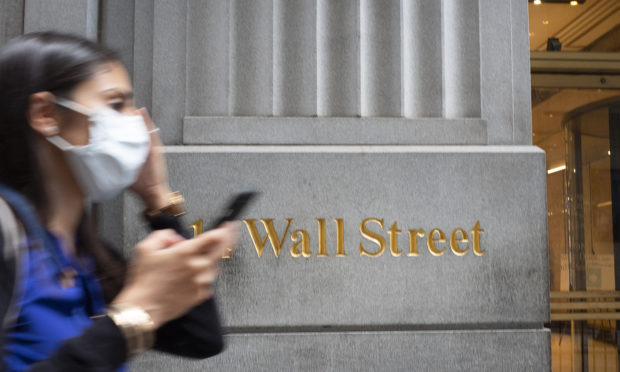Stock indexes ended mixed on Wall Street Wednesday, even as the market extended its winning streak to a third day and gains in technology companies pushed the Nasdaq to an all-time high.

A woman wearing a mask passes a sign for Wall Street, Tuesday, June 30, 2020, during the coronavirus pandemic. (AP Photo/Mark Lennihan)
The S&P 500 rose 0.5%, coming off the heels of a whiplash start to the year where its worst quarterly performance since 2008 gave way to its best quarter since 1998. Treasury yields and the price of oil rose. Stocks in Europe fell, while markets in Asia ended mixed.
Encouraging reports on the U.S. economy helped nudge the market higher. Investors continue to balance signs that the economy is improving after grinding nearly to a halt in the spring due to the coronavirus pandemic against worry that the number of new confirmed infections is surging in parts of the U.S. and other hotspots around the globe.
“There’s this tug-of-war going on between an improving economy and a reminder that we don’t have a vaccine yet, and we’re getting a second wave of infections in some parts of the country,” said Phil Orlando, chief equity strategist at Federated Hermes. “The question is which one of these two competing narratives are going to win?”
The S&P 500 gained 15.57 points to 3,115.86. The Nasdaq composite, which is heavily weighted with technology companies, climbed 95.86 points, or 1%, to 10,154.63, a record high.
The Dow Jones Industrial Average fell 77.91 points, or 0.3%, to 25,734.97. The index drifted between a gain of 206 points and a loss of 99 points. Small company stocks also fell. The Russell 2000 index dropped 14.05 points, or 1%, to 1,427.31.
Markets around the world roared back last quarter on hopes that economies are beginning to pull out of the severe, sudden recession that struck after governments shut down businesses in hopes of slowing the spread of the coronavirus.
But a recent resurgence of COVID-19 cases, particularly in the U.S. South and West, has raised doubts about whether those hopes were premature or overdone.
In the United States, a report said that the manufacturing sector returned to growth last month, a much better reading than the slight contraction that economists were expecting.
Earlier, a separate report suggested private employers hired more workers than they cut in June. Payroll processor ADP also revised its previously reported numbers for May, saying that private employers actually added nearly 3.1 million jobs that month instead of cutting 2.8 million.
But the June growth in ADP’s payroll report wasn’t as strong as economists expected. The U.S. government’s more comprehensive monthly jobs report will arrive Thursday.
“As we look forward, we think April represented the bottom of the cycle,” said Orlando. “The economic numbers have been materially better in May and June, and we think that the trend continues in the third quarter.
The problem with that narrative is this wave of infections we’ve seen in the Southern and Western states. That’s something troubling.”
In the world’s third-largest economy, a quarterly Bank of Japan survey showed manufacturers’ sentiment plunged to its lowest level in more than a decade, as the pandemic crushes exports and tourism.
But in the world’s second-largest economy, a separate survey showed China’s manufacturing activity improved in June, adding to signs of a gradual recovery. A similar survey for the 19-country eurozone showed an improvement in manufacturing in June, with the industry almost growing again after widespread shutdowns.
Analysts said that while the data pointed in the right direction, it shows that an economic recovery from the pandemic will be slow.
Communication sector stocks, which have benefited as people stuck at home spend more time online, helped lift the market Wednesday, offsetting losses in financial, energy and industrial companies. Netflix rose 5.7% and Facebook gained 4.6%.
Amazon led the way higher among companies that rely on consumer spending. The stock climbed 4.4%.
Health care stocks also rose. Pfizer gained 4.6% after it and German biotech company BioNTech announced encouraging, preliminary data on their COVID-19 vaccine candidate.
Meanwhile, Tesla surpassed Toyota as the most valuable global auto company. Shares in the electric car and solar panel maker rose 3.7%. Toyota sold more than 10.7 million vehicles worldwide last year, while Tesla sold only a fraction of that at 367,500.
The yield on the 10-year Treasury rose to 0.68% from 0.65% late Tuesday. It tends to move with investors’ expectations for the economy and inflation.
Benchmark U.S. crude oil for August delivery rose 55 cents to settle at $39.82 a barrel. Brent crude oil for September delivery rose 76 cents to $42.03 a barrel.
Asian markets ended mixed. In Europe, France’s CAC 40 dropped 0.2% and Germany’s DAX lost 0.4%. The FTSE 100 in London fell 0.2%.